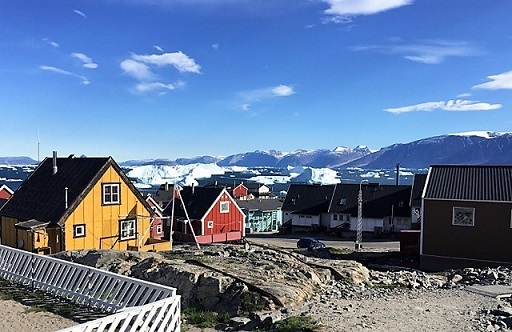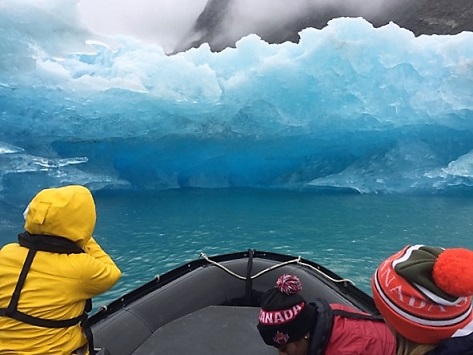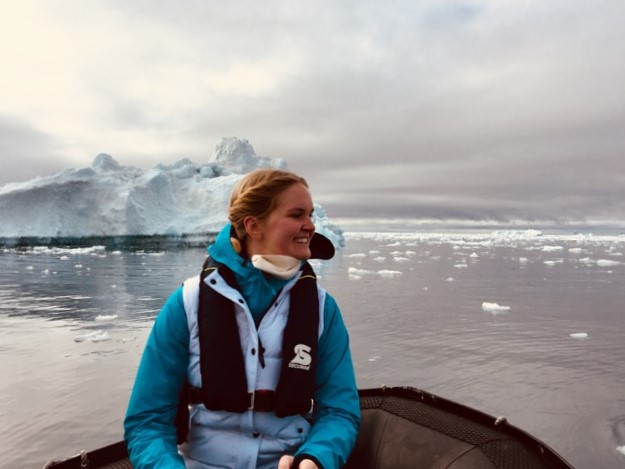Sep 5, 2018 - SoGerman Team


The 2018 Students on Ice educational expedition saw 130 students from 20 countries travel throughout the Arctic and learn about the importance of the polar regions for our planet. Isabel Josam, a medical student from Germany, received a full scholarship to participate and SoGerman was able to ask her about her Students on Ice experience.

SoGerman (SG): How did you hear about the Students on Ice program and what made you want to participate? (Had you been to Canada before?)
Isabel Josam (IJ): I heard about Students on Ice through my sister’s friend. She was a former participant and amazed by the opportunity. As soon as I heard about the organization I knew I wanted to participate. I did some research on the internet and that made me want to join the next expedition even more. I applied and was lucky to be chosen for the program and was also able to receive a full scholarship.
What kind of preparation was required?
After I was chosen for the expedition, I had to do some organizing. I planed my travel itinerary, filled out the necessary forms and went through the packing list. We received a reading package with information about Inuit culture, arctic nature and landscape. I found it so interesting that I started to read more and from different sources, though that is not really necessary because the education program is designed in a way that everybody can participate. Last but not least I tried to prepare myself mentally for this once-in-a-lifetime opportunity – and I was still overwhelmed by all the beautiful places I saw and the connections I made.
What were you hoping to get from the experience?
I study medicine in Germany and have a strong interest in the natural sciences, biology and biochemistry for example. I also like academic work in general. That is my first link to the Students on Ice education program. I am also politically engaged in Germany. I am a peer educator in project that was created by the Federal Agency for Civic Education. As a Heinrich Böll Foundation scholarship-recipient, I am also really interested in and concerned about climate change. I was hoping to gain more knowledge about the sensitive ecosystem of the Arctic and learn more about how we can take action to protect and preserve these environments. I also wanted to create a new network of people that inspire and empower me so that we can work together towards a more sustainable future for everyone.
What was the experience like? What did you see and do?
The experience is actually really hard to describe. Every morning I went out on deck and a new magical place was right there. We saw all kinds of different fjords, sounds, landscapes, animals and communities. Some days we went out in Zodiacs and either stayed on the water or went to shore. Usually, we had various options and could take part in workshops on different topics. We could learn about the plants, rocks, or history of the area or become a scientist our self that day. There were many different citizen science projects on board the ship, including taking water samples, recording measurements and documenting wildlife. In some places there were options to go for a hike or go out on the water in a kayak. It was always a really hard choice to make. When we stayed on the ship we had many options for workshops as well. The main overall topics were: ocean literacy, climate change and adaptation, sustainable development goals as well as truth and reconciliation. I also really loved Isuma which means „meaning“ in Inuktitut. We could reflect on our experience through art. You could paint, meditate, sing or dance. This is just a really brief summary of the diverse projects that were going on every day for the two weeks.
Was it the way you imagined? If not, how did it differ?
I honestly did not really know what to imagine before I came to Canada. I saw pictures and read stories of former expeditions but I could not believe that it was going to be me. Something I did not expect were the close personal relationships on board. All members of the expedition were so interesting and unique. Especially the staff had many stories to share. Every day I had the chance to learn new things just through the inspiring people who surrounded me.
What did you get out of the experience and what will you be bringing back to Germany?
I definitely feel incredibly empowered by my SOI experience. I am bringing home new knowledge and new ideas. I am hoping to put the things I learned into action and work together with my new friends. They always told us that the journey is not over when you return home and it is so true. I feel so fortunate and cannot wait to share my memories and pay it forward.
What else do you want people to know about the experience? About Students on Ice?
At the very beginning of the journey Geoff Green, the Founder, Executive Director and Expedition Leader of SOI, said to us: “The ones that give the most, are the ones that get the most.“ I discovered that this sentence is really true. Sometimes it might be hard to put yourself out there and ask critical questions, start a conversation with a stranger or be away from home but in the end, you will never regret it. I tried every day to make the most of the experience. It is really something you will probably only experience once and you do not want have regrets that you missed out on an opportunity. So: put yourself out there and seize the day.
The ones that give the most, are the ones that get the most. -Geoff Green, Founder of Students on Ice
Photos are courtesy of Isabel Josam.
For more information on the 2018 Students on Ice Expedition, please see: https://studentsonice.com/expedition/arctic-expedition-2018/
